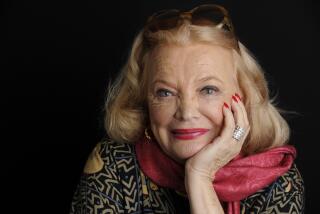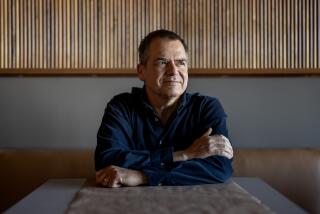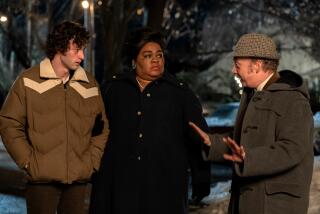‘Husbands’: Three men and their inner babies
- Share via
It’s impossible to separate what makes John Cassavetes’ “Husbands” exhilarating from what makes it exasperating. Following three suburban family men into the maw of a midlife crisis brought on by a mutual friend’s untimely death, the movie is set at a fever pitch that at times approaches outright hysteria. Rarely has depression been so manic.
Cassavetes conceived the 1970 movie, incongruously subtitled “A comedy about life death and freedom,” as a showcase for three actors: himself, Peter Falk and Ben Gazzara, whose character takes the reminder of his own mortality most violently to heart. He gave his costars substantial latitude to develop their own characters, although according to biographer Marshall Fine, who provides commentary on the DVD, he also wrote a 300-page “novel” to shape their understanding.
Unable to face their families after the funeral, the three men decamp to a dimly lit bar, where they spend a dark night of the soul that transpires in what feels like real time. In this version, which restores 11 minutes to the theatrical cut, the sequence runs more than half an hour, much of it devoted to a contest in which the bar’s other patrons warble vintage songs as part of an ad hoc contest, although they’re often rewarded with varying degrees of abuse. In one particularly ugly exchange, Gazzara hectors a sad-looking barfly, played by Leola Harlow, cutting off her attempts with shouted orders to sing “from the heart.”
Monolithically devoted to his actors, sometimes at the expense of composition, pace and other tools of the art form, Cassavetes allows no distance from his protagonists’ self-loathing, nor from their overwhelming hostility to the opposite sex. Apart from Gazzara’s wife, who pulls a knife on him when he finally stumbles home, their spouses remain distant presences, the invisible chains tying them to their deadening lives.
The three men, all in their early 40s, are relics of a pre-feminist era, burdened with a patriarch’s responsibilities in a world where the privileges of masculinity are rapidly diminishing. When Cassavetes and Falk tote up their characters’ collective baggage -- five children, two houses, four garages, two cars -- it’s with a sense of resignation, not pride. It’s too late for them to escape, nor would they know how to act if they did.
They get a chance to spread their wings when Gazzara decides to fly to London and the others tag along, but their sordid dalliances are pathetic and unsuccessful. Cassavetes succeeds in luring a leggy blond (Jenny Runacre) into bed, but rather than make love he wrestles with her in a manner both brutal and childish. Falk, meanwhile, hesitantly seduces a woman who speaks no English and is repulsed when she returns his advances. Their madonna-whore double standards are clearly rooted in the characters’ manifest dysfunctions, but the movie never bothers to explore why any woman would go off with one of these ambulatory train wrecks. The men’s desperation is explained; the women’s is assumed.
Although the success of his “Faces” allowed Cassavetes a larger budget, “Husbands” still looks as if it was shot on a shoestring. The camera slips out of focus as it attempts to follow the actors’ unscheduled movements, their faces shrouded in and sometimes swallowed by shadow. (The film’s soft, low-light look is particularly difficult to capture on DVD, although Sony’s disc does a generally solid job.) That unvarnished quality is of course just what Cassavetes’ acolytes admire, but the film’s raw-nerve approach becomes grueling over the long haul. Empathy shades into sympathy turns to morbid fascination. You can’t stop watching, even if you want to.
--
More to Read
Only good movies
Get the Indie Focus newsletter, Mark Olsen's weekly guide to the world of cinema.
You may occasionally receive promotional content from the Los Angeles Times.










